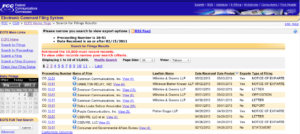The FCC has issued a public notice for changes to the VRS program. The changes are not in place yet. The FCC is asking for comments before they decide on the changes. Some of the suggested changes are major and one of them involves a rate reduction.
Wow! The Public Notice from the FCC has generated a lot of discussion via email and social media like Facebook. This is a healthy scenario. Rarely has such a matter on public policy generated a lot of dialogue in the deaf and hard of hearing community. But there lies the danger of some parties trying to mislead or distort the message. One website (www.savemyvrs.com) seems to be neutral representing all VRS companies, but it is backed by Sorenson. The whois lookup for the ISP indicates that the owner of the domain is Sorenson:

Another website claiming to be neutral is vrsca.org. While the whois does not indicate it is Sorenson-related, the ISP is located in Utah:

It is common knowledge that VRSCA is funded by Sorenson. While the domain name “vrsca.org” seems to indicate it is a non-profit organization, a lookup on guidestar.com does not bring up VRSCA or Video Relay Services Consumer Association. Doing a Google search on VRSCA, there are no hits when it comes to organization headquarters, nor does it have a Board of Directors or the like. It is not a separate organization; rather it is an arm of some organization, Sorenson in this case. (Disclaimer: I have some very good friends who are part of VRSCA–this is in no way a personal affront on you folks, but merely pointing out the association between VRSCA and Sorenson. I still love you folks on a personal level.)
Both Sorenson and VRSCA have embarked on an offensive disparaging the FCC public notice, trying to influence deaf and hard of hearing people to follow their party line.
While Dr. Z has some concerns about the notice, he feels the public needs to discuss this matter among themselves and decide what is best for the when it comes to VRS. The bottom line in all of this is “functional equivalence”–meaning what hearing people get in the way of their communication needs, we deaf and hard of hearing people legally must have those. What is the cost of functional equivalence? What are the parameters of functional equivalence? To use an example–speed of answer. The FCC mandates 80% of all calls must be answered in 120 seconds measured monthly. If they cut rates too much, providers need to cut interpreters, then this increases the possibility of not meeting the answer time requirement. Where is the line between rates and functional equivalence? I think this is the crux of the ongoing discussion. VRS providers, of course need to realize a profit margin to create innovation and enhance features that promote functional equivalence.
Deaf and hard-of-hearing people like hearing people also need a functionally equivalent market. When hearing people go into a phone store (ATT, Verizon, etc.) they see 50-100 phones in front to choose from. Deaf and hard-of-hearing people should have the same choice, not being locked into one or two. Those phones do not have to be specially designed for video calls. The software inside those phones can do a lot of wonderful and great things. (Dr. Z has been developing software since he attended college-45-50 years ago, that’s how old Dr. Z is. ) Dr. Z understands the power of software and he’s still developing software to this day.
We need a functionally equivalent service and a functionally equivalent market. This should be the objective of the FCC’s Public Notice. And rates should be sensitive to the concept of functional equivalence.
Let the dialogue continue.
Dr. Z cares about your communication access.
Disclaimer: Dr. Z is currently the Vice-President of Business Development and Outreach at CSDVRS, LLC.




